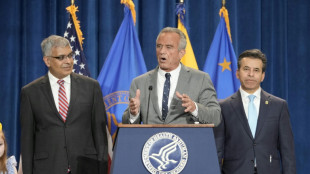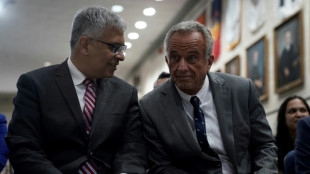
-
 Indian army says new exchange of gunfire with Pakistan
Indian army says new exchange of gunfire with Pakistan
-
Epstein accuser Virginia Giuffre takes own life in Australia: family

-
 Hundreds of buildings damaged, dozens injured in 6.3 Ecuador quake
Hundreds of buildings damaged, dozens injured in 6.3 Ecuador quake
-
India and Pakistan's Kashmir fallout hits economy too

-
 Francis's funeral to be grand farewell to 'pope of the poor'
Francis's funeral to be grand farewell to 'pope of the poor'
-
Pogacar faces defiant Evenepoel at Liege-Bastogne-Liege

-
 Chelsea eye great escape against Barcelona in Women's Champions League
Chelsea eye great escape against Barcelona in Women's Champions League
-
Iran, US to hold new round of high-level nuclear talks

-
 'Energy and effort' pay off for Reds as Blues' woes continue
'Energy and effort' pay off for Reds as Blues' woes continue
-
Albatross and closing birdie lift China's Liu to LPGA Chevron lead

-
 On the horizon? Wave of momentum for high seas treaty
On the horizon? Wave of momentum for high seas treaty
-
Developing countries should fast-track US trade deals: World Bank president

-
 Grizzlies' Morant 'doubtful' for must-win game 4 v Thunder
Grizzlies' Morant 'doubtful' for must-win game 4 v Thunder
-
Trump in Rome for pope funeral in first foreign trip of new term

-
 Trump says Russia-Ukraine deal 'very close' after new Kremlin talks
Trump says Russia-Ukraine deal 'very close' after new Kremlin talks
-
US rookies lead PGA pairs event with McIlroy and Lowry in hunt

-
 Trump tariff promises get a reality check
Trump tariff promises get a reality check
-
Warriors coach Kerr 'relatively optimistic' injured Butler will play game 3

-
 Postecoglou hopes 'Stonecutter's Credo' can inspire Spurs
Postecoglou hopes 'Stonecutter's Credo' can inspire Spurs
-
PSG lose unbeaten Ligue 1 record ahead of Arsenal showdown

-
 Venezuela accuses El Salvador president of 'human trafficking'
Venezuela accuses El Salvador president of 'human trafficking'
-
Own goal takes Sundowns to African final against Pyramids

-
 Scores of buildings damaged, 20 injured in Ecuador quake
Scores of buildings damaged, 20 injured in Ecuador quake
-
US stocks extend rally as market eyes busy calendar next week

-
 Pope's death triggers surge of disinformation he fought against
Pope's death triggers surge of disinformation he fought against
-
Rovanpera takes control of Rally Islas Canarias

-
 Zelensky insists Crimea is Ukrainian as US envoy meets Putin
Zelensky insists Crimea is Ukrainian as US envoy meets Putin
-
Patel and Mendis help Sunrisers beat Kings in Dhoni's 400th T20

-
 Copa del Rey ref statements 'unacceptable': Real Madrid after boycotting final build-up
Copa del Rey ref statements 'unacceptable': Real Madrid after boycotting final build-up
-
Insurance CEO's accused killer pleads not guilty to federal murder charges

-
 FBI arrests Wisconsin judge for shielding undocumented migrant
FBI arrests Wisconsin judge for shielding undocumented migrant
-
Brazil ex-president Collor de Mello jailed for corruption

-
 Zelensky insists Crimea 'belongs' to Ukraine as US envoy meets Putin
Zelensky insists Crimea 'belongs' to Ukraine as US envoy meets Putin
-
Real Madrid boycott Copa del Rey build-up over referee complaints

-
 Trinidad and Tobago votes for parliament, PM, with opposition in lead
Trinidad and Tobago votes for parliament, PM, with opposition in lead
-
IMF chief hails 'constructive' Spring Meetings held under tariff uncertainty

-
 Iran FM Araghchi in Oman ahead of nuclear talks with US
Iran FM Araghchi in Oman ahead of nuclear talks with US
-
Dozens of buildings destroyed, 20 injured in Ecuador quake

-
 Young Barca must 'enjoy' Real Madrid Copa final fight: Flick
Young Barca must 'enjoy' Real Madrid Copa final fight: Flick
-
Pakistan and India border closure separates families

-
 Brazil's Bolsonaro 'stable' after post-surgery setback
Brazil's Bolsonaro 'stable' after post-surgery setback
-
Catholics in secular Cuba hail Francis as 'bridge'

-
 US envoy Witkoff, Putin discuss 'possibility' of direct Russia-Ukraine talks
US envoy Witkoff, Putin discuss 'possibility' of direct Russia-Ukraine talks
-
Community seeks answers after French school knife killing

-
 German prosecutors seek jail terms in VW 'dieselgate' trial
German prosecutors seek jail terms in VW 'dieselgate' trial
-
Sabalenka makes winning start at Madrid Open

-
 EU, US should de-escalate and negotiate trade deal: IMF Europe director
EU, US should de-escalate and negotiate trade deal: IMF Europe director
-
Russia accuses Ukraine of killing general in car bombing

-
 Emery wants FA Cup glory and Champions League berth for Villa
Emery wants FA Cup glory and Champions League berth for Villa
-
Buildings destroyed, one injured in Ecuador quake


No longer a death sentence: Four decades of living with HIV
Forty years after the discovery of HIV, AFP looks at how far we have come in fighting a deadly virus that was once shrouded in fear and shame but is now treated as a manageable chronic condition.
- 1981: First alert -
In June 1981, US epidemiologists report five cases of a rare form of pneumonia in gay men in California.
It is the first alert about Acquired Immune Deficiency Syndrome (AIDS), still unknown and unnamed.
Doctors then identify "opportunistic infections" among intravenous drug users and in haemophiliacs and Haitian residents in the United States.
The term AIDS appears for the first time in 1982. The disease is wrongly presented as a "homosexual disorder".
- 1983: Identifying HIV -
In January 1983, researchers in France, Francoise Barre-Sinoussi and Jean-Claude Chermann, working under Luc Montagnier, identify the virus that "might be" responsible for AIDS.
Their discovery is published on May 20 in the journal Science.
The following year, US specialist Robert Gallo is said to have found the "probable" cause of AIDS, the retrovirus HTLV-III.
The two viruses turn out to be the same, and in May 1986 it becomes officially known as the Human Immunodeficiency Virus, or HIV.
- 1987: Anti-retroviral treatment -
In March 1987, the first anti-retroviral treatment known as AZT is authorised in the US. It is expensive and has severe side effects.
The United States and France agree that Gallo and Montagnier should get joint credit for discovering HIV. But the 2008 Nobel prize goes to Barre-Sinoussi and Montagnier.
- Early 1990s: Fallen stars -
In July 1985, US actor Rock Hudson announces he has AIDS. His death three months later is the first high-profile AIDS death.
A host of other stars succumb to the disease, including legendary pianist Liberace (February 1987), British singer and Queen frontman Freddie Mercury (November 1991), and the Russian dancer and choreographer Rudolf Nureyev (January 1993).
In 1994, AIDS becomes the leading cause of death among Americans aged between 25 and 44.
- 1995-96: New approach -
Two new classes of drugs signal the start of combinations of different anti-retroviral therapies.
Called tri-therapies, they provide the first effective treatment for HIV.
1996 is the first year in which the number of AIDS deaths declines in the United States. While US numbers decline, they rocket in Africa, where AIDS is the biggest killer by 1999.
- 2001: Generic medicine -
In 2000, UNAIDS and five major drug companies sign a deal to distribute affordable treatments in poorer countries.
A year later, the World Trade Organization changes intellectual property rules to allow developing countries to make generic versions of patent-protected HIV treatments.
In 2004, the country with the world's highest HIV caseload, South Africa, ends years of AIDS denialism and makes anti-retroviral treatments available through the public health system.
- 2010: First cure -
Timothy Ray Brown, an American man who had been living with HIV for over a decade, is cured of the virus after undergoing cancer treatment.
Brown underwent two bone marrow transplants containing a mutation of a gene that blocks HIV from attacking host cells.
- 2012: Preventive pill -
In July 2012, the first-ever daily pill to help prevent HIV infection is approved by US regulators. Truvada is a pre-exposure prophylaxis, or PrEP, taken by high-risk people who are HIV-negative in order to prevent them from being infected.
- 2017: Treatment spreads -
For the first time, more than half of all people living with HIV are receiving anti-retroviral treatment.
The proportion rises to three-quarters: 28.7 million people are being treated out of 38.4 million who are infected, according to UNAIDS in 2021.
- 2020-2021: Covid setback -
The Covid-19 pandemic disrupts access to health systems, testing and treatment, slowing progress in the fight against AIDS, which in 40 years has killed 40.1 million people.
In 2021, 650,000 AIDS deaths and 1.5 million new infections are recorded.
UNAIDS hopes to end AIDS as a public health threat by 2030.
A.Mahlangu--AMWN


